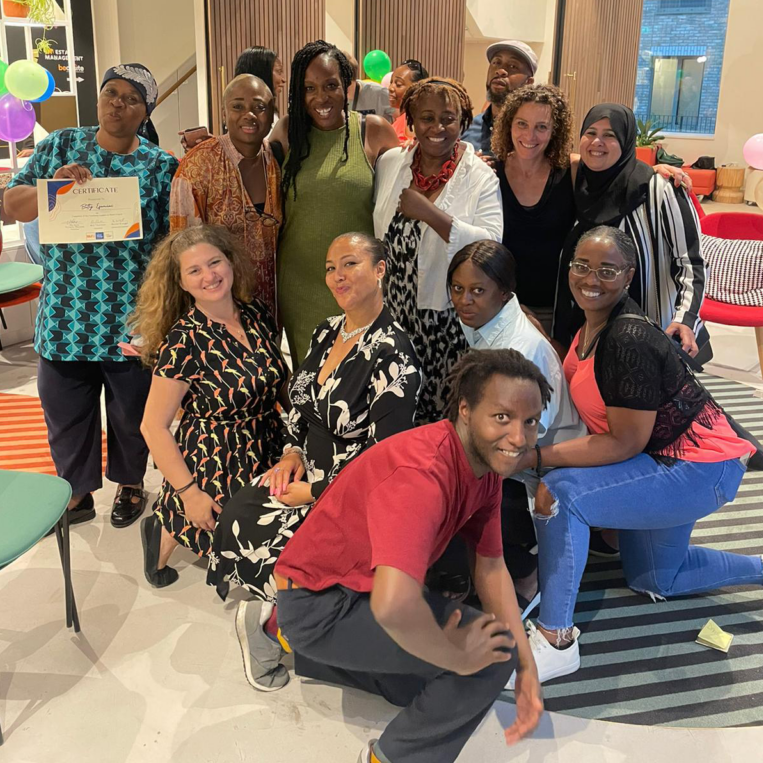Trust-based funding approaches are the slow-food version of conservation finance. These approaches are intimate and time-intensive by nature and are built on personal relationships, significant upfront investments of time, and open channels of communication. Trust-based approaches put the burden of onerous administrative tasks, commonly found in grantmaking (e.g. understanding proposed actions, evidence of impact, and verification), on the regranters, giving grantees more time to do their important work.

Given the time and effort that it takes to conduct trust-based grant making, how can these trust-based approaches be scaled to make a meaningful impact at regional and global scales?
At Moonjelly, we seek to scale the impact and reach of our trust-based funding through simplified grant-making and peer-to-peer network building. To simplify grant-making, we have codesigned a funding approach called “Building Blocks of Conservation Impact” that we described in an earlier post. In this article, we focus on how we are building an Impact Network of Moonjelly partners and growing this network through a process we call “Pay It Forward Scaling.”
Building a Conservation Impact Network
Trust-based conservation finance requires having trust or building trust in individuals communities, and sometimes institutions. Once that trust is established, the need for cumbersome paperwork and verification is reduced because we trust our partners to deliver what they promised. As long as trust endures, so does funding. Trust in the Moonjelly ecosystem is maintained like it is in any other relationship — with constant and open conversation, frequent visits, working together, sharing of meals and cultural events, and reciprocity.
Of course, all of this takes time upfront. A traditional hub-and-spoke approach to regranting, where the funder sits in the middle and makes grants on a bilateral, often short-term basis, would significantly limit how many trusted partners a renter could have.
At Moonjelly, instead of a hub and spoke approach, we are scaling trust by building a Conservation Impact Network (see for instance, David Ehrlichman). The idea here is to create a web of trust-based relationships among a set of autonomous conservation organizations and community groups that are connected to each other through genealogical, cultural, geographical or other personal ties. Each connection is a trust-based relationship which means each connection is personal and serves as a conduit for knowledge and resource sharing, support, and of course, verification. With more links, and more distributed links, the positive aspects of trust-based funding is reinforced. Similarly, the potential nodes along which trust can be lost are also increased — giving more partners a stake in ensuring the good behaviour of their fellow Moonjelly partners.

Pay It Forward Scaling
The biggest challenge in building a conservation impact network is finding new groups and communities to bring into the network, groups that build the trust within the network and simultaneously its conservation impact.
Building the Moonjelly Conservation Impact Network is largely the responsibility of Moonjelly’s founding “1st Level” Indigenous partners — the anchors of our network. Trust-based funding from Moonjelly comes with just one condition — each of our partners is required to identify, train, and provide support to at least one other Indigenous or local conservation group or community, paid for by Moonjelly.
Once a partner has had their own Building Blocks funded for at least two years, their next round of MJ funding must include a request for support for Building Blocks that will finance the work of another trusted conservation group of their choice. In this way, our partners “Pay Forward” the support they receive from Moonjelly by repeating the process with one of their trusted partners. In essence, we trust that our partners trust their partners, teach their partners, provide open and constant communication with these partners, and use their own judgement about verifying the continued trustworthiness of these partners. By doing this, the network grows, based on trust, and so does the conservation impact and scale.

For instance, in the Pacific region, we are starting our work with our partners at Kōrero O te ‘Ōrau (KO) who work in Rarotonga and throughout the Cook Islands. KO already has begun the process of Paying It Forward by working directly with traditional and community leaders in Atiu, an outer island in the Cook Islands archipelago. KO has worked with the Atiu community to develop new Building Blocks to support the carving of local traditional fishing canoes by the island’s youth. At the same time, KO is also working with Moonjelly and the Ocean Knowledge Action Network to Pay Forward its knowledge of reef monitoring, restoration, and management to assist the Dulan AMIS Indigenous community of Taiwan that has recently been authorized to exercise more traditional control over its coastal ecosystems.
Like many types of relationships, there is no reason for a Pay It Forward relationship to be exclusive. In fact, if multiple partners “Pay It Forward” to the same new partners, then our network develops trust-based redundancies that make the overall network stronger and more effective. For instance, our partners at KO and also our partners in the Community of Atiu may choose to both directly Pay It Forward to the Dulan AMIS community, each providing different knowledge and support. The Dulan AMIS community could then turn around and Pay It Forward to other Indigenous communities in Taiwan as well as other islands within the Austronesian region. Moonjelly plans on having independent nodes operating and sharing knowledge all over the world — beginning with our core partners around the Indo-Pacific and in Latin America.
Impact Network + Pay It Forward Scaling = Indigenously-led Ocean Conservation at Scale
Growing an Impact Network through Pay It Forward Scaling not only builds a dynamic and nearly infinitely expandable trust-based ecosystem of conservation finance, as each new “generation” of trusted partners is added to the Moonjelly family, the roles and responsibilities of the grantees expand. This approach to decentralizing trust and decision-making means that within just a few rounds of Paying It Forward, Moonjelly will be a predominantly Indigenously-led Conservation Impact Network.
To help fund and learn more about the work Moonjelly and its partners are doing, please contact Bryce Groark — [email protected]

Moonjelly Foundation is a frictionless, trust-based, no-cost ocean conservation regranter. We find money for our proven partners, so they can spend more time doing good. We use a Pay It Forward Approach to build our Conservation Impact Network that will allow us to increase conservation impact, strengthen trust, and ensure an ever-expanding role for Indigenous leadership in conservation finance.

Network Weaver is dedicated to offering free content to all – in support of equity, justice and transformation for all.
We appreciate your support!



